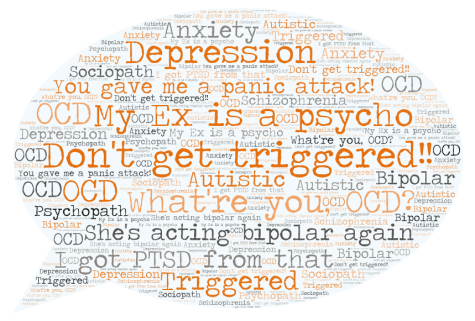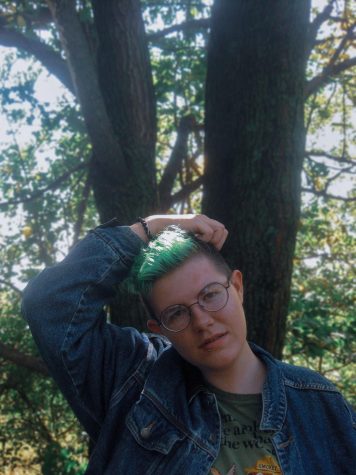Lazy Language
 “What, are you triggered?” Cue flashbacks to freshman year when the only word in anyone’s repertoire was triggered, spit out at classmates anytime they displayed the slightest infraction of annoyance or irritation. The phrase might have replaced ‘and like’ as the most overused and annoying collection of verbal sound to hit my eardrums.
“What, are you triggered?” Cue flashbacks to freshman year when the only word in anyone’s repertoire was triggered, spit out at classmates anytime they displayed the slightest infraction of annoyance or irritation. The phrase might have replaced ‘and like’ as the most overused and annoying collection of verbal sound to hit my eardrums.
Mental health is an elephantine sized topic with gen X (millennials) and gen Z, and while we’re known for having a higher awareness and acceptance for mental health, our daily language continues to butcher it like Wednesday night’s dinner.
“When I started teaching I think it was way more intense and severe and now one would ever think of saying ‘..I have to go see my therapist..’ – you would die if you found out people knew anything about that. … [Using resources] isn’t seen as a sign of weakness but just an okay understandable response to a situation or stimulus you’re having a difficult time processing. .” Said James Webb, Ames High English teacher and sponsor for Mental Health Club.
Misuse and misunderstanding of terms crop up in language like spring flowers in May. They’re everywhere, sewn into sentences as fluidly as a verb. Despite the collective widespread practice, a majority of people don’t appear to realize the backhanded affect their speech has.
“I would tease people and be like ‘oh you’re super anal and OCD…’ and then I had a student that I really cared about who was washing his hands to the point his hands would bleed during class…” Webb said, “then when you see what it actually is, it makes you even more frustrated when you hear people kind of belittle it and turn it into a meme basically instead of acknowledging something that’s a serious life struggle for someone.”
“If someone is sad, that matters … that’s not something you should say ‘oh well that doesn’t matter’ emotions matter – but sadness is not the same as depression, and someone who is very nervous and uptight that can matter too, and that can be a problem, but that’s not the same as OCD,” said Daniel Klass, Ames High psychology teacher, “it’s also kind of a slight of a back of the hand to someone who actually has the disorder, like it’s a casual thing, it’s not a casual thing and these things are very serious when you actually have the disorder.”
In April the AP psychology class teaches a unit on disorders, beginning every year with ‘what does it mean to have a disorder?’. The class doesn’t use the phrase mental health, they spend the whole year using the term disorder. AP psychology studies the classification of disorders and the symptoms, ending the unit with treatments and how people cope and live with disorders.
“No one is anything, a person’s a person – they might have a disorder but the way we talk obviously matters,” Klass said.
Depression and anxiety have become more of a commonplace conversation, but other disorders remain cloaked in confusion and misconceptions. Media often portrays characters with schizophrenia as violent erratic, but few studies exist to back this up. Schizophrenics are more likely to cause harm to themselves than others. OCD is primarily shown through excessive organization but in reality takes many forms in different obsessive and compulsive behaviors.
“Some of the other areas I think there’s a lot more confusion about what constitutes mental health. Even things like eating disorders… sometimes we classify things in the wrong boxes,” Webb said.
It’s a centuries-old habit to use language without giving it forethought, and rarely do people give their words enough consideration to bite their tongue or consider the meaning of a phrase before they throw a sentence out. There’s no proofreading in a spoken conversation, but it’s not just the student body that needs to remember this.
“I’ve had multiple conversations with teachers actually about it and especially over the word triggered… and they usually use it in the context of ‘when I see a student pull a phone out I get triggered,’” Webb said. “It can be awkward, and it’s a lot easier if I’m talking to a student because I have a position of authority but when I’m speaking to a colleague it is a lot trickier and it helps me remember what students feel when they have to sum up the courage to address a peer, it is a lot different so it’s a good reminder for me.”
Adults, the people who can often seem above our speed bumps in etiquette, are just as guilty. This habit is not a singular group’s problem, it’s an issue that’s built into society’s behavior as fluidly as polite greetings – except these phrases are sharp dismissals of people’s everyday struggles.
“I think the words we use do matter and not just about this but in so many areas of society now too, like gender. I think those are things we need to be conscious of and a lot of it I think is education and people being willing to stand up and say something, not necessarily in a rude confrontational way but just in an advocating way or educational way that we can really help each other learn,” Webb said. “I think a lot of people don’t recognize that the words that they use hurt people and would be shocked and aghast to learn the words they were using were hurting people.”
No one is expecting a complete change in language, only more awareness when it comes to the words we use.
Your donation will support the student journalists of Ames High School, and Iowa needs student journalists. Your contribution will allow us to cover our annual website hosting costs.

Back from the dead of summer and coffee induced manic episodes for senior year, I've returned to talk about the uselessness of automobiles alongside other...

























